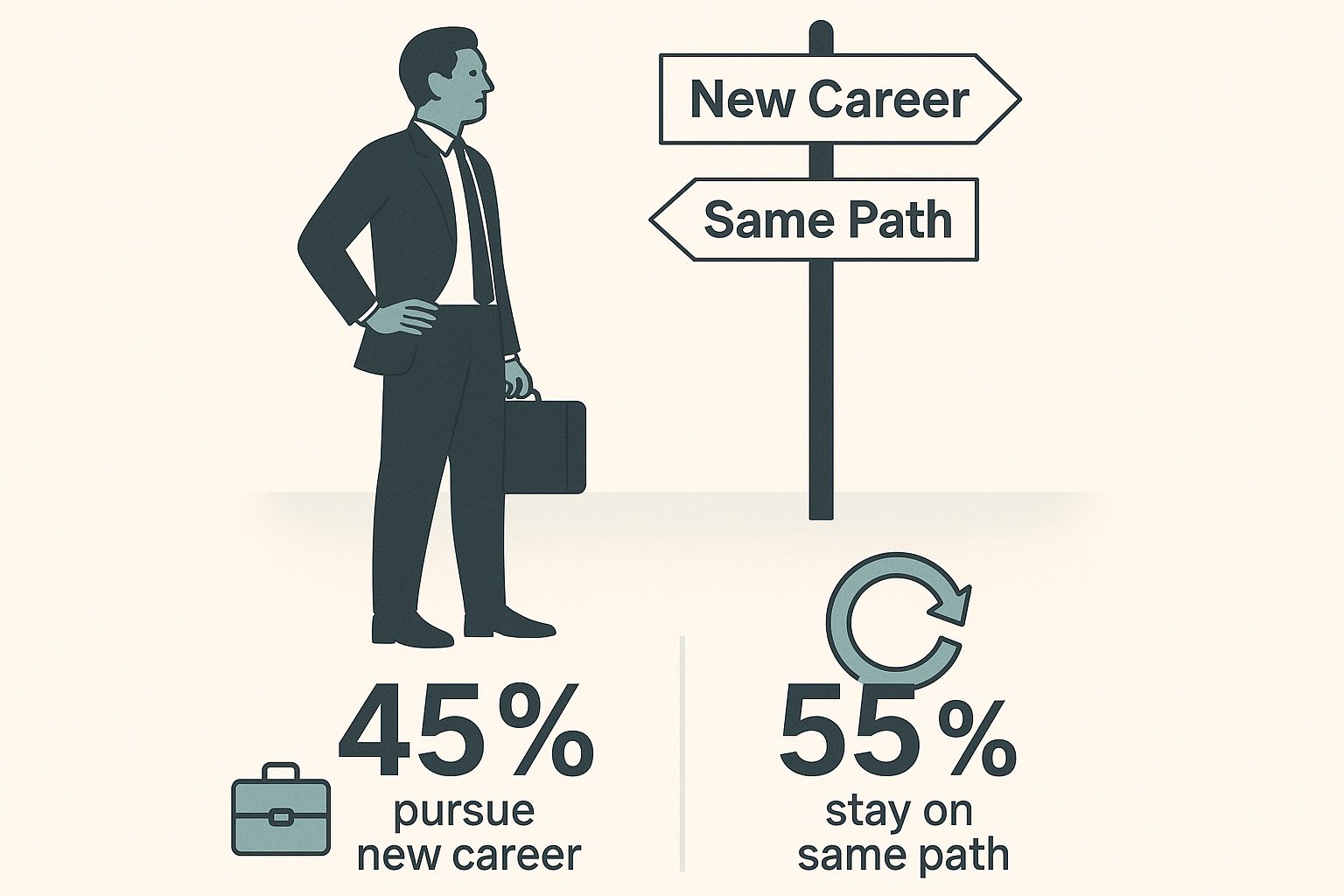Why Starting Fresh at 40 Is Your Secret Advantage

This infographic depicts someone confidently navigating a career crossroads. It symbolizes the empowering choice between a new path and the status quo, highlighting the potential of a fresh start at 40. This image emphasizes that 40 isn't an ending, but rather an exciting new beginning full of possibilities.
Leveraging Your Experience
Starting a new career at 40 may feel like a big leap, but it's often a significant advantage. You've cultivated a wealth of transferable skills over two decades. These skills, sometimes hidden in plain sight, are highly sought after.
Your problem-solving abilities, leadership qualities, and emotional intelligence, for example, are valuable assets. These are qualities younger candidates may still be developing. This experience makes you a powerful candidate in any field.
Feeling nervous about change is normal. Consider adapting strategies used for managing driving test nerves. These same techniques can empower you to approach career transitions with confidence.
Financial Stability and Clarity
At 40, you've likely built greater financial stability than someone in their 20s. This provides a cushion during your transition, enabling you to invest in training or explore entrepreneurship.
Current workforce trends reveal a rising number of individuals over 40 seeking new careers. In fact, the 35–44 age group boasts the highest percentage of job seekers, with 46% actively pursuing new roles. Dive deeper into these statistics. This trend highlights a shift where experience and maturity are increasingly valued.
Embracing the New Normal
Reinventing yourself at 40 isn't unusual; it's becoming the norm. Your accumulated wisdom, combined with a deeper understanding of your values, allows you to pursue work aligned with your passions. This translates to greater job satisfaction and a stronger sense of purpose.
When embarking on a new path, consider the principles of Strategic Planning. By understanding and applying strategic planning, you can clarify your goals and create a roadmap for success. You're uniquely positioned to find a career that's more than just a job; it's a fulfilling new chapter.
The Surprising Truth About Midlife Career Success
Embracing a new career path at 40 is becoming increasingly commonplace, and the success stories are more abundant than you might imagine. This isn't just a feeling; the data supports it. This shift reflects a change in how we view our professional lives, moving beyond the traditional idea of staying in one job forever. More and more, people are seeking purpose and fulfillment in their work, no matter their age.
Midlife Career Changers: A Growing Trend
Historically, changing careers later in life was often perceived as a risky move. However, this viewpoint is no longer relevant. For instance, data reveals that 48% of professionals between the ages of 40 and 44 have already made at least one career change. Moreover, nearly one-fifth of this group have transitioned across three or more industries. This data highlights that career changes in one's 40s are not only prevalent but often involve significant leaps into entirely new areas. Find more detailed statistics here. Considering a change? You might find this helpful: How to switch careers at 40.
The Rise of Career Coaching for the 40+ Demographic
Further reinforcing this trend is the increasing demand for career coaching tailored to those over 40. The percentage of career coaching clients in this age group has seen a dramatic increase, rising from about 15% to 65% in recent years. This points to a growing awareness of the specific needs and hurdles faced by midlife career changers. It also underscores the valuable experience these individuals bring, even when entering a brand-new field.
Digital Transformation Opens Doors
The rise of digital technology has been a key factor in enabling these midlife career transitions. Remote work opportunities and online learning platforms like Coursera and Udemy have made it simpler than ever to develop new skills and explore different industries. This flexibility allows individuals to apply their existing knowledge and experience in fresh and exciting ways. This adaptability makes experienced professionals incredibly valuable in today's ever-changing job market.
Uncovering Your Hidden Career Assets and Strengths

Starting a new career at 40 isn't about starting over. It's about recognizing the incredible value of your accumulated experience. It's about seeing your professional journey not as a blank slate, but as a rich tapestry woven with threads of knowledge, skills, and wisdom. You might be interested in: How to discover your passion. This journey of rediscovery begins with uncovering hidden career assets and strengths you may not even realize you possess.
Identifying Your Transferable Skills
Decades in the workforce have equipped you with a remarkably diverse and powerful skillset. Think about the communication skills you’ve honed, the countless problems you've solved, and the times you've stepped up as a leader. These transferable skills are highly sought after across various industries.
Your experience also brings nuanced skills like crisis management and mentorship. These are invaluable assets that can significantly enhance your contribution in any role. Identifying these skills is the first step towards showcasing their relevance in a new and exciting field.
Recognizing Your Leadership Qualities
Look beyond technical skills and consider your leadership qualities. Have you mentored colleagues, spearheaded projects, or successfully navigated complex team dynamics? These experiences are a testament to your leadership potential, a quality that many younger candidates may not yet possess.
This experience, even in a different industry, can be your distinguishing factor. Your maturity translates into an ability to manage teams, inspire colleagues, and drive meaningful results – essential traits that employers value highly.
Showcasing Your Unique Professional Perspectives
Your years in a particular industry have given you a unique perspective, a deep well of institutional knowledge, and a keen understanding of industry trends that newcomers simply don't have. It's crucial to translate this experience into a language that resonates with your target industry.
Think about how your past successes can address the challenges in your new field. This requires reframing your experiences to highlight their relevance and showcasing your adaptable and forward-thinking mindset.
Leveraging Your Network and Emotional Intelligence
Your professional network and developed emotional intelligence are invaluable resources. These assets can open doors to informational interviews, mentorship opportunities, and potential job leads.
Emotional intelligence allows you to navigate workplace relationships with greater finesse and build rapport with colleagues and clients. These skills, honed over time, are powerful tools as you embark on a new career at 40.
To help you visualize your strengths, consider the following table:
Skills Assessment Matrix for Career Changers Over 40
A comprehensive comparison of hard skills, soft skills, and unique advantages that professionals bring to new careers
| Skill Category | Examples | How to Leverage | Industries That Value This |
|---|---|---|---|
| Hard Skills | Project Management, Data Analysis, Microsoft Excel, Budgeting | Highlight specific accomplishments and quantifiable results in your resume and interviews. | Virtually all industries, particularly those with a focus on efficiency and data-driven decision-making. |
| Soft Skills | Communication, Problem-solving, Leadership, Mentorship | Share anecdotes demonstrating these skills during interviews and networking events. | Industries that value teamwork, collaboration, and strong interpersonal skills, such as healthcare, education, and customer service. |
| Unique Advantages | Industry Knowledge, Strategic Thinking, Crisis Management, Adaptability | Position yourself as a seasoned professional who can bring valuable insights and perspective to a new field. | Industries undergoing change or disruption, where experience and adaptability are highly prized. |
This table provides a framework for thinking about the valuable skills you already possess. By identifying and leveraging these assets, you can confidently present yourself as a highly desirable candidate in your new career.
Strategic Industry Research and Career Exploration
Embarking on a new career at 40 is an exciting adventure, a journey of self-discovery and reinvention. It demands careful planning and in-depth research, similar to crafting a detailed roadmap for a thrilling expedition. This section provides a guide for exploring potential careers with the attention they deserve. It's more than just skimming job postings; it's about strategically positioning yourself for a fulfilling second act.
Identifying Growing Industries
First, identify growing industries that are actively seeking experienced professionals. The healthcare sector, for instance, consistently needs skilled nurses. Xavier University's Accelerated Bachelor of Science in Nursing program offers a fast-track option for those drawn to this rewarding path. Becoming a Nurse at 40: Is It Too Late? The tech industry also often values experience and adaptability, recognizing the unique perspectives seasoned professionals bring to the table. Industries experiencing rapid growth and transformation can be particularly welcoming to career changers over 40.
Utilizing LinkedIn for Research
LinkedIn is more than a job board; it's a powerful networking and research platform. Use it to connect with people in your target field, learn about industry trends, and gain valuable insights into company cultures. This proactive approach empowers you to understand the nuances of your desired career from those already thriving in it.
Conducting Informational Interviews
Informational interviews are invaluable resources for gaining first-hand knowledge. These conversations offer insights you won't find in job descriptions, allowing you to build connections and learn about the day-to-day realities of different roles. For further guidance, explore our article on How to master career changes at 40. Remember to always be respectful of people's time and approach these conversations with genuine curiosity.
Testing Your Interest Through Low-Risk Opportunities
Before fully committing, consider low-risk ways to test the waters. Consulting projects, volunteer work, or part-time roles offer practical experience and can solidify your passion for a new field. This hands-on approach can significantly inform your decision-making process and provide valuable real-world experience.
Evaluating Salary and Growth Potential
Finally, realistically evaluate salary expectations and growth potential. Research industry benchmarks and consider how your existing experience translates into compensation in a new area. Assess the long-term career trajectory and ensure it aligns with your personal and professional goals. This strategic evaluation sets the stage for a fulfilling and sustainable career that resonates with your aspirations.
Smart Skill Building That Fits Your Life and Budget
Starting a new career at 40 doesn't mean draining your savings on pricey degrees or quitting your current job. This section explores strategic, budget-friendly ways to gain in-demand skills while keeping your income flowing. Thinking strategically about planning and setting goals is incredibly helpful when transitioning careers. The insights in this article on Strategic Planning offer valuable guidance.

Cost-Effective Learning and Certifications
Explore cost-effective online learning. Platforms like Coursera and Udemy offer a wealth of courses across diverse fields. If you're interested in project management, for example, these platforms frequently offer specialized certifications recognized by employers. Also, consider industry-specific training programs that provide the biggest return on your investment. Many professional organizations offer reasonably priced certifications directly applicable to their fields.
Leveraging Existing Resources and Free Options
Many employers offer valuable education benefits. See if your company provides tuition reimbursement or professional development stipends applicable to training in your new target career. This could allow you to upskill without any out-of-pocket expense. Don't forget about valuable free learning resources. While free online courses may not always offer formal certifications, they can build practical skills demonstrable in your portfolio or during interviews.
Prioritizing Skills and Building a Sustainable Learning Schedule
Focus on the skills that need your immediate attention. Start with the most critical skills required for your target roles, then strategically broaden your learning from there. Building a sustainable learning schedule is essential. Divide your learning into manageable chunks that fit your existing commitments. Even dedicating 30 minutes a day can yield significant progress over time. This approach fosters consistent progress without overwhelm.
Demonstrating Your Newfound Skills to Potential Employers
Showing potential employers your new skills is crucial. Build a portfolio showcasing projects you’ve completed during training, and highlight these skills in your resume and cover letter. Be ready to discuss your learning journey during interviews, emphasizing your commitment to growth and your passion for this new career direction. This builds credibility and confidence, demonstrating your dedication to prospective employers. This proactive approach sets you apart from other candidates, proving your investment in your new career path.
Networking and Personal Branding for Seasoned Professionals
At 40, networking takes on a new dimension. It's no longer about building a network from scratch. Instead, your existing network becomes a powerful launchpad, propelling you towards connections in your desired industry. This section explores how to maximize your experience while projecting an image of preparedness and continued growth.
Activating Your Existing Network
Consider your past colleagues, clients, and even classmates. These dormant connections hold immense potential. Reconnecting doesn't need to be complicated. A simple message acknowledging their accomplishments or sharing a relevant industry article can reignite the conversation. Focus on offering genuine value upfront, rather than immediately seeking favors, to cultivate authentic relationships.
Building New Relationships Authentically
Attending industry events with a specific goal, such as connecting with particular individuals or gaining insights into a specialized area, optimizes your networking efforts. Engaging in conversations with genuine interest and sharing your unique perspective, rather than just exchanging business cards, creates a lasting positive impression. This nurtures connections that feel organic and mutually beneficial.
Crafting a Compelling Personal Brand
Your personal brand is your professional story. It's how you present your skills and experience to the world. At 40, this narrative should showcase your journey while highlighting your adaptability and eagerness to embrace new challenges. Refining your elevator pitch– a concise summary of your career goals and unique value proposition – will prepare you for any networking opportunity. You might find valuable insights in resources like How to master personal branding with books.
Strategic Social Media Engagement
Social media platforms like LinkedIn are powerful tools for showcasing your expertise. Consistently sharing insightful content related to your target industry positions you as a thought leader. Engaging with others' posts and participating in relevant online communities expands your network and demonstrates your active involvement in the field. This builds credibility and attracts a following of potential collaborators or employers.
Updating Your Online Presence
Your LinkedIn profile is often the first encounter you have with potential employers. Ensure it accurately reflects your current career aspirations and showcases your most relevant experience. Include a professional headshot, a compelling summary, and a detailed work history highlighting quantifiable achievements. Creating a personal website or portfolio further strengthens your online presence, providing a dedicated space to showcase your work and demonstrate your skills in depth.
Creating Polished and Professional Materials
Developing high-quality materials, including a tailored resume and personalized cover letters for each opportunity, demonstrates professionalism and a serious interest. These documents should clearly articulate how your skills and experience align with the specific requirements of each role. This focused approach significantly increases your chances of making a strong impression. Remember, your experience is a significant asset. Present yourself with confidence, and your network and personal brand will unlock exciting new opportunities.
Overcoming Roadblocks and Building Unshakeable Confidence
Starting a new career at 40 can feel like navigating uncharted territory. It’s a journey filled with exciting possibilities, but also potential roadblocks. However, with the right mindset and a toolbox of practical strategies, these obstacles can become stepping stones to a fulfilling new chapter. This section addresses common concerns like age discrimination, financial worries, and imposter syndrome, providing practical solutions to help you navigate these hurdles. Looking for deeper meaning in your career change? This exploration of how to find purpose in life might provide valuable insights as you embark on this new path.
Addressing Age Discrimination and Skepticism
While age discrimination is illegal, subtle biases can still exist. The key is to reframe your experience not as a liability, but as your greatest strength. Showcase your adaptability and eagerness to learn new skills. In interviews, highlight how your past experiences have uniquely equipped you to handle the specific challenges of the role. Respond to any skepticism with confidence, demonstrating the value you bring to the table.
Remember, your accumulated wisdom and professional maturity are invaluable assets.
Managing Financial Concerns and Salary Adjustments
Financial considerations are a natural part of any career transition. Building a 6-12 month financial cushion before making the leap can significantly reduce stress and provide a safety net. This buffer allows you to focus on your job search and any necessary training without the added pressure of immediate financial strain.
Be open to exploring roles with high growth potential, even if the initial salary might be slightly lower than your previous one. A long-term perspective, focusing on future opportunities and advancement, can lead to greater financial rewards in the long run.
Overcoming Imposter Syndrome and Maintaining Motivation
Starting fresh in a new field can sometimes trigger imposter syndrome, making you question your abilities. Combat these doubts by actively acknowledging your past achievements and focusing on your transferable skills. Remind yourself of your capabilities and the value you bring.
Maintaining motivation during a job search, especially a longer one, is crucial. Celebrate small victories, such as completing a relevant certification or networking with influential people in your new field. View rejections not as setbacks, but as opportunities for growth. Use any feedback received to refine your approach and strengthen your resilience.
Balancing Family and Career Transition
Changing careers while juggling family responsibilities requires careful planning and open communication. Talk to your family about your goals and the temporary adjustments that might be needed. Creating a realistic schedule can help you dedicate time to job searching and skill-building while still prioritizing family time. This structured approach, combined with open communication, can create a supportive home environment.
To further assist you in navigating these challenges, we've compiled a table outlining common obstacles and practical solutions:
Common Career Change Challenges and Solutions
Practical solutions for the most frequent obstacles faced by professionals starting new careers at 40
| Challenge | Impact Level | Practical Solution | Timeline to Overcome |
|---|---|---|---|
| Age Discrimination | Medium | Emphasize experience and adaptability in resume and interviews. | Ongoing |
| Financial Concerns | High | Build a 6-12 month savings cushion and explore bridge employment. | 6-12 months |
| Imposter Syndrome | Medium | Acknowledge past achievements and focus on transferable skills. | Ongoing |
| Family Responsibilities | High | Open communication and a structured schedule. | Ongoing |
| Maintaining Motivation | Medium | Celebrate small wins and view rejections as learning opportunities. | Ongoing |
As this table shows, many of these challenges require ongoing effort and a positive mindset.
Embarking on a new career at 40 is a significant step, but it’s also an incredibly empowering one. It’s about aligning your work with your passions and creating a more fulfilling life. Ready to take the next step? Learn more about how Henri Den can support you on your journey at https://henriden.com.





